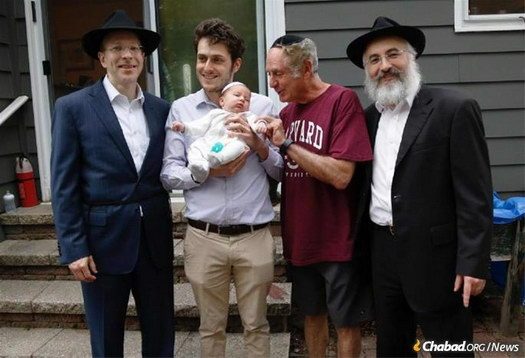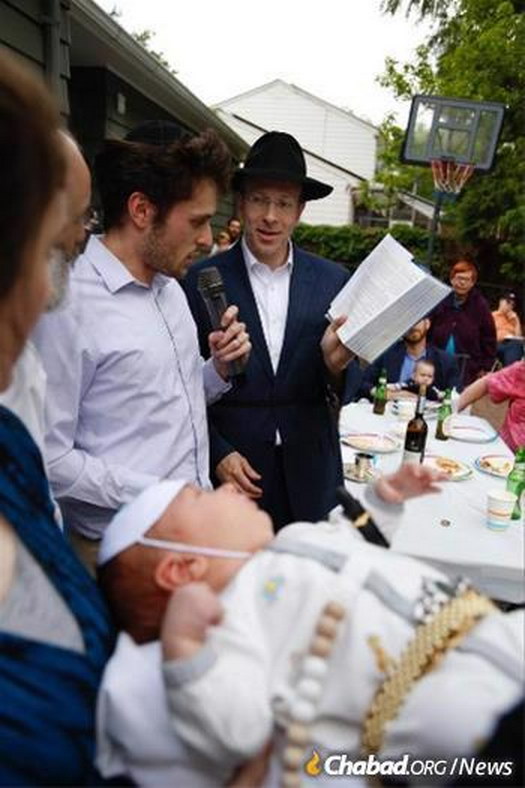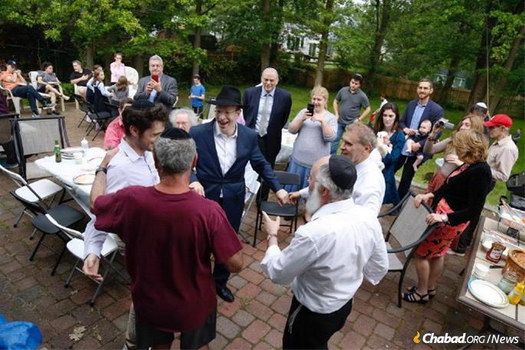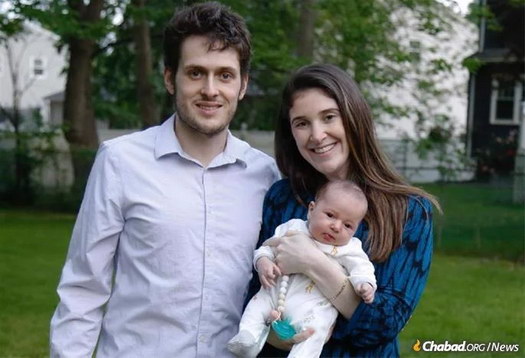
In New Jersey, Three Generations of Firstborns “Redeemed”
by Mendel Super – chabad.org
Michael and Hannah Mandler, proud first-time parents, had another less common mitzvah to do after circumcising their bundle of joy, whom they had named Zev Mordechai.
They had to redeem their firstborn son from a Kohen, in a ceremony known as pidyon haben, or the redemption of the firstborn.
Redeem their own son?
The ritual harks back to the time when all firstborns had been designated to serve as kohanim, or priests, in the Holy Temple. After the privilege was bestowed exclusively upon the descendants of Aaron the High Priest, a firstborn male must be symbolically redeemed from a Kohen 31 days following his birth—or any time after, if he hadn’t been redeemed on time.
The Mandlers, new to Lawrenceville, N.J., contacted Rabbi Yitzchak Goldenberg, spiritual leader of the Young Israel of Lawrenceville synagogue and co-director of Chabad of Lawrenceville with his wife, Dina.
“We’d never celebrated a pidyon haben in our community,” Goldenberg tells Chabad.org. In fact, according to Young Israel’s president, Charles Miller, this would be the first in the synagogue’s half-century history.
For Goldenberg, the timing couldn’t have been better. “Our community hadn’t come together since the pandemic, and this presented the perfect opportunity.” Together with the Mandlers, they planned an outdoor, community-wide barbecue to mark the occasion.
Goldenberg recruited his colleague Rabbi Aryeh Weinstein, adult-education director at Lubavitch of Bucks County, Pa., to serve as the Kohen from whom the baby would be redeemed.
As the day neared, Michael Mandler realized that he, as a firstborn male, had never had a pidyon haben himself. “I was raised traditionally,” explains Mandler, “I had a brit, but we never did a pidyon haben.” Mandler’s family, Argentine émigrés to the United States, settled in Albuquerque, N.M., where they first became acquainted with Chabad at Chabad of New Mexico, led by Rabbi Chaim and Devorah Leah Schmukler.
But it was when he met his wife, Hannah, from an observant New Jersey family that he began to become more familiar with the traditions. “I love my son more than the money,” he chuckles, “of course, I wanted to redeem him!”
Mandler’s father, Raul, wasn’t going to make it to the ceremony, but at the last minute, plans changed, and it turned out he would be attending. That’s when Michael realized there would be a third generation being redeemed that day: Raul, too, was a firstborn son.
On June 2, a warm summer’s day, Lawrenceville made history not once, but three times, as three generations of Mandlers were redeemed in an age-old rite, in exchange for five silver coins.
“My Israelite wife has borne me this firstborn son,” Michael informed the Kohen, Rabbi Weinstein.
“Which would you rather have—your firstborn son, or the five coins which you are obligated to give me for the redemption of this your firstborn son?” asked Weinstein.
“I want this, my firstborn son,” declared Michael (much to his wife Hannah’s relief), “and here you have five coins which are required of me for the redemption.”
The symbolic exchange carries special meaning to Michael. “It’s a choice you make,” he muses. “To me, it’s about valuing your child more than material possessions. These traditions are so important to carry on; we need to be the spirit of Judaism.”
For the rabbi, this rare ceremony reflects the recent growth of the community as a younger demographic joins their vibrant community. From a Sunday morning tefillin club to weekly Shabbat services, the active community is attracting new members in what may be a post-pandemic demographic shift. The Goldenberg’s, whose portfolio includes nearby Rider University, now run a “Mommy & Me” program, bringing their reach to all segments of the Jewish community with an emphasis on family-oriented activities.
“Family comes first,” Michael adds, “especially when we’ve lost so much.”
This article has been reprinted with permission from chabad.org















